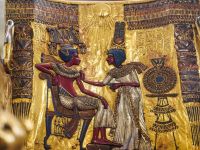Pro-civil marriage activists vowed to stand firm in their demands Tuesday, one month after first erecting a tent in Riad Solh Square to protest the slow passage of reform.
“I’ve lost count of the nights that I have spent here,” said campaigner Mazen Abu Hamdan, who has endured some 30 sleepless nights filled with constant noise, blazing heat, pouring rain and occasional abuse from pedestrians, as well as radical religious groups, scornful of his act of civil disobedience.
While Abu Hamdan has lasted more than most, he has received near-constant support from up to 100 activists who have taken shifts guarding the makeshift camp.
“Waking up with all the noise and the yelling every morning can be very annoying … but you have to take a stand,” said Abu Hamdan.
The campaigners are part of Chaml, a non-sectarian group promoting youth activism, whose members are refusing to leave the piece of prime Downtown Beirut real estate until their demands regarding the passage of a new civil marriage law are met.
The draft legislation is currently in committee stage and awaiting a parliamentary vote.
Celebrating their first month on the square with biscuits, cakes and late night discussion about how to attract more followers, the young activists are keen to highlight the relative attainability of their goal, which they feel sets them apart from the recent wave of anti-sectarian protests.
The protests calling for an “end to the sectarian regime” drew tens of thousands of people onto the country’s street over the last few months but have now been suspended until further notice.
“There are many things that you can work on but some things you can change in a few months or years, like a law, which can then help you to change the mentality of people, and open up the door for further action,” said a Chaml activist, Tony Daoud, who visits the tent almost daily.
Unlike previous attempts to enact civil marriage legislation, the proposed law does not seek to abolish personal status laws, instead advancing that people be allowed to “opt-out” of the system, which is presently dictated by Lebanon’s various religious sects that have diverging rules on issues such as inheritance, marriage, divorce and custody.
“This is the only movement that I would follow blindly because they have a clear agenda,” said activist Sara Obeid. “They are well organized, know what they are doing and know what they want. I don’t have the time and patience for things that are not going to work.”
The Constitution, in addition to the Taif Accord that ended the Civil War, call for the establishment of a Lebanese national law, which could be applied to all citizens equally, irrespective of religion or sex.
Reform, however, has been slow to materialize and although civil marriages – conducted in Cyprus and elsewhere – have enjoyed state recognition since 1936, Chaml insists more must be done.
“We have learned from history that if we want to change you have to accept what is possible … but our objective is to end all injustice and fight for the human rights of every woman, man and child,” said Daoud.
“If you look at the points in the personal status laws, many are just scary in their treatment of women and children … Laws should be in the best interest of everybody,” he added.
The movement’s encampment has grown over the last month, with its second tent being “unofficially inaugurated” by former Prime Minister Salim Hoss two weeks ago.
Hoss, who has been described as a “personal friend of the campaign,” visited the site and was seen to be opening the second tent, apparently preserving it from potential police harassment, with authorities keen to avoid “insulting the former prime minister’s honor,” said Daoud.
The initial act of defiance, staged on March 18, had been planned for months and carefully orchestrated to lure authorities toward the Grand Serail in order to allow a small group of activists to pitch the a tent unnoticed.
While some minor clashes occurred and several protesters were briefly detained following the skirmish, caretaker Interior Minister Ziyad Baroud later reportedly ordered Internal Security Forces to allow the protesters to stay.
An uneasy truce has since prevailed between the two sides.
“We insist on reaching our goal but refuse to use violence. When you fight the police, you lose your cause, you lose your objectives and you lose supporters,” said Daoud.
“If we move from [the camp], we will only do so to move our cause forward and progress it.”








